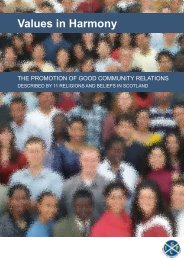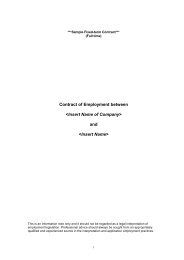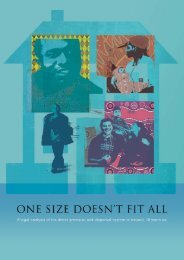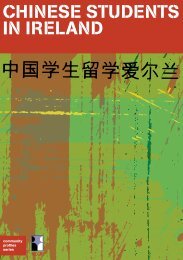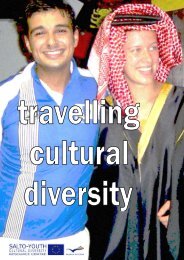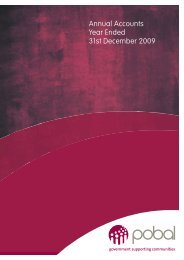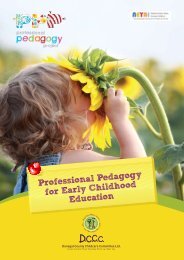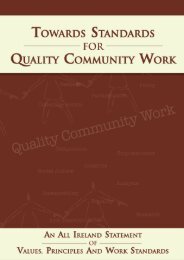Intercultural Education in the Post-Primary School - National Council ...
Intercultural Education in the Post-Primary School - National Council ...
Intercultural Education in the Post-Primary School - National Council ...
You also want an ePaper? Increase the reach of your titles
YUMPU automatically turns print PDFs into web optimized ePapers that Google loves.
• students can explore <strong>the</strong> contribution ofdiverse cultures to our ma<strong>the</strong>maticalculture• students can learn to value ‘<strong>the</strong> hiddenma<strong>the</strong>matics embedded <strong>in</strong> culturaleconomicactivity’. For example, <strong>the</strong>maths practiced by identifiable culturalgroups, by tribal societies, by thosewithout formal education, and so on.A detailed audit of <strong>the</strong> opportunities for<strong>in</strong>clud<strong>in</strong>g <strong>in</strong>tercultural <strong>the</strong>mes <strong>in</strong>Ma<strong>the</strong>matics as well as sample lessons canbe found on <strong>the</strong> CD-ROM and atwww.ncca.ie.Modern LanguagesThe Junior Certificate modern languagessyllabus makes several specific referencesto <strong>the</strong> importance of culture under itsgeneral educational aims, <strong>in</strong>clud<strong>in</strong>g ‘to givepupils an awareness of ano<strong>the</strong>r culture andthus a more objective perspective onaspects of <strong>the</strong>ir own culture’. Similarly, atsenior cycle, <strong>the</strong> general aims of <strong>the</strong>syllabus <strong>in</strong>clude ‘to equip learners with abroad acqua<strong>in</strong>tance with <strong>the</strong> cultural,social and political complexities of <strong>the</strong>countries <strong>in</strong> which <strong>the</strong> target language is anormal medium of communication andthus to help raise <strong>the</strong>ir awareness ofcultural, social and political diversitygenerally.’Culture <strong>in</strong>fuses every area of languageteach<strong>in</strong>g: for example, learn<strong>in</strong>g any verb <strong>in</strong>French <strong>in</strong>volves learn<strong>in</strong>g <strong>the</strong> familiar tuform and <strong>the</strong> polite (or plural) vous form,with implications of register andappropriateness. Learn<strong>in</strong>g about howChristmas is celebrated <strong>in</strong> Spa<strong>in</strong> will<strong>in</strong>volve learn<strong>in</strong>g about los Reyes Magosand turrón. It is second nature to languageteachers to <strong>the</strong>n make comparisons with<strong>the</strong> students’ own language and culture,<strong>the</strong>reby <strong>in</strong>evitably rais<strong>in</strong>g <strong>the</strong>ir awarenessof o<strong>the</strong>r cultures and sensitis<strong>in</strong>g <strong>the</strong>m tosimilarities and differences.There is scope for tak<strong>in</strong>g <strong>the</strong> <strong>in</strong>terculturalbasis which already exists a step fur<strong>the</strong>r: toconsider more consciously and deliberately<strong>the</strong> diverse cultures and ways of life <strong>in</strong> <strong>the</strong>country (or countries) of <strong>the</strong> targetlanguage; to consider <strong>the</strong> diverse cultures<strong>in</strong> Ireland; to consider specifically issues ofhuman rights and responsibilities andconflict and conflict resolution.When students are discuss<strong>in</strong>g <strong>in</strong>terculturalissues <strong>in</strong> <strong>the</strong> target language, <strong>the</strong>y mayhave difficulty <strong>in</strong> express<strong>in</strong>g complicatedideas or responses. However, <strong>the</strong> verystruggle to express <strong>the</strong>mselves will sensitisestudents to <strong>the</strong> difficulties which may beexperienced by non-native speakers ofEnglish now liv<strong>in</strong>g <strong>in</strong> Ireland. If <strong>the</strong>re arenon-native speakers of English <strong>in</strong> <strong>the</strong> class,a language class can also provide <strong>the</strong>proverbial level play<strong>in</strong>g field, whereEnglish-speak<strong>in</strong>g students are notautomatically at an advantage as <strong>the</strong>y maybe <strong>in</strong>, say, a history or geography class.In an <strong>in</strong>clusive modern languageprogramme• students are sensitised to culturaldifferences with <strong>the</strong> country or countriesof <strong>the</strong> target language and elsewhere• students are exposed to a range ofmaterials, <strong>in</strong>clud<strong>in</strong>g literature, whichpresents a variety of perspectives andallows <strong>the</strong>m to explore values andattitudes• materials touch<strong>in</strong>g on issues of humanrights and responsibilities,discrim<strong>in</strong>ation and equality, and conflictand conflict resolution are used assource material for practis<strong>in</strong>g bothreceptive and productive use of <strong>the</strong>target language• language is not approached simply as<strong>the</strong> study of language as a tool ofcommunication or even as <strong>the</strong> study of a70<strong>Intercultural</strong> <strong>Education</strong> <strong>in</strong> <strong>the</strong> <strong>Post</strong>-<strong>Primary</strong> <strong>School</strong>




